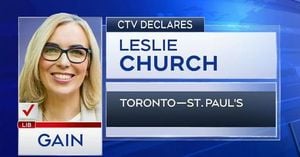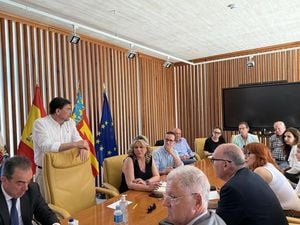On April 29, 2025, the political landscape in Germany continues to evolve as the newly formed government under Chancellor-designate Friedrich Merz prepares for its first steps. The CDU, led by Merz, has unveiled its list of ministers, marking a significant shift in the country’s governance following the early federal election held on February 23, 2025. The announcement came just a day after the CDU presented its cabinet, which includes several notable figures and some surprises.
Among the prominent appointments is Philipp Amthor, a rising star in the CDU, who will serve as the Parliamentary State Secretary in the newly established Federal Ministry for Digitalization and State Modernization. This ministry is set to play a crucial role in modernizing Germany’s bureaucratic processes and enhancing its digital infrastructure. Amthor is expected to oversee initiatives that could potentially allocate millions to municipalities in Mecklenburg-Vorpommern (MV), addressing local demands for modernization and support.
Amthor’s appointment was highlighted during his appearance on the ARD talk show "Maischberger," where he discussed his transition into the federal government and the implications of the Merz cabinet. "I am excited to take on this challenge and contribute to a more efficient and modern state," Amthor stated during the program. His presence on the show was part of a broader discussion that included environmental activist Luisa Neubauer, who critiqued the government’s plans from a sustainability perspective.
Meanwhile, the CDU's announcement of its ministers has sparked anticipation regarding the Social Democratic Party (SPD), which is yet to finalize its cabinet members. The SPD's members' decision on the coalition agreement is set to conclude on the same day, with results expected to be announced shortly after. This delay has led to speculation about the SPD's strategy and the potential names that will emerge for ministerial positions, including key roles in finance, defense, and justice.
As the SPD prepares to announce its ministerial candidates, the CDU has already confirmed the appointments of several influential figures. Notably, Karsten Wildberger, previously a top manager at MediaMarktSaturn, has been appointed as the head of the Federal Ministry for Digitalization and State Modernization. His expertise in the digital sector is seen as a valuable asset for the new government.
The cabinet also includes other significant appointments, such as Johann Wadephul as Foreign Minister and Katherina Reiche as Minister for Economic Affairs. The CDU has filled seven ministerial posts, while the CSU will contribute three ministers, emphasizing a collaborative approach within the coalition.
Friedrich Merz, during a CDU party conference, emphasized the importance of this new government in addressing pressing issues such as economic recovery, migration, and international relations. He stated, "We will implement significant parts of our promises from day one," indicating a proactive approach to governance. This includes a focus on stricter immigration controls and a commitment to support Ukraine amidst ongoing geopolitical tensions.
Former Chancellor Angela Merkel has expressed her support for Merz, planning to attend his election as Chancellor, a gesture that signifies continuity within the party despite the leadership change. Her presence is expected to bolster confidence among party members as they navigate the transition to the new administration.
In addition to the political maneuvering, the CDU has faced criticism regarding the selection of its ministers. Carsten Linnemann, the party's general secretary, defended the cabinet choices, stating, "We need a strong cabinet. We should not look at direction but at the best candidates available." This response comes amid concerns raised by organizations like LobbyControl, which have pointed out potential conflicts of interest among some appointed ministers, particularly regarding Katherina Reiche’s ties to the energy sector.
As the SPD finalizes its candidates, their leader Lars Klingbeil has indicated that the announcement will likely occur on May 5, 2025. This timeline places pressure on the SPD to align its priorities with those of the CDU, especially in light of the coalition agreement that has already been approved by the CDU.
Markus Söder, the CSU leader, has also confirmed his party's ministerial selections, which include Dorothee Bär for research and technology, and Alois Rainer for agriculture. Söder emphasized the need for a change in direction, stating that the new government must address the challenges facing Germany with a fresh perspective.
Political analysts are closely watching the developments within the SPD as the party grapples with its internal dynamics and the implications of joining a coalition government with the CDU. With approximately 358,000 SPD members eligible to vote on the coalition agreement, the outcome could significantly influence the party's future direction and its relationship with the CDU.
The new government under Friedrich Merz is poised to face numerous challenges as it seeks to implement its agenda while maintaining coalition harmony. The upcoming weeks will be crucial in determining how effectively the Merz administration can navigate these complexities and respond to the expectations of both its supporters and the broader German electorate.
In summary, the political landscape in Germany is shifting as the Merz government takes shape, with key appointments and ongoing negotiations setting the stage for the new administration's priorities. The focus on digitalization and state modernization reflects a commitment to addressing contemporary challenges, while the SPD's forthcoming decisions will be pivotal in shaping the coalition's effectiveness.





